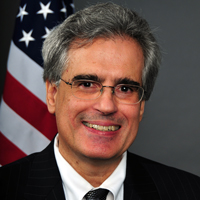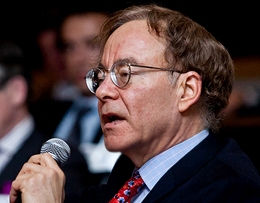This is the season for report cards and grades. The securities laws are enforced by the plaintiff’s bar and the SEC. How well are they doing? What grades do they deserve?
I. Private Enforcement
In terms of private litigation, 2012 …
As annual meeting season approaches, so too does the first deadline for companies listed on the NASDAQ Stock Market (Nasdaq) to comply with amended compensation committee rules. Traditionally, evaluation of director independence of Nasdaq-listed companies differed for purposes of serving …
The following post comes from Professor Jeff Schwartz of the University of Utah S.J. Quinney College of Law:
The influential SEC Advisory Committee on Small and Emerging Companies recently approved a new set of recommendations. The boldest among them is …
The following speech was delivered by Commissioner Aguilar on April 16, 2013 to the North American Securities Administrators Association (“NASAA”), Annual NASAA/SEC 19(d) Conference in Washington D.C.
Good morning. Thank you for inviting me to deliver the opening remarks of …
Equity ownership in the United States no longer reflects the dispersed share ownership of the canonical Berle-Means firm. Instead, in our new working paper, The Agency Costs of Agency Capital: Activist Investors and the Revaluation of Governance Rights, Ron …
The “European Market Infrastructure Regulation,” known as EMIR, was adopted on July 4, 2012, as the Regulation on OTC Derivatives, Central Counterparties and Trade Repositories (EU 648/2012), and took effect in all EU Member States on August 16, 2012. As …
This is the heyday of institutional investor activism in proxy contests. Insurgents are running more slates and targeting larger companies. They are also enjoying a higher rate of success: 66% of proxy contexts this year have been at least partially …
Earlier this week, the SEC announced that it had entered into a non-prosecution agreement (NPA) with Ralph Lauren Corporation to resolve an investigation under the Foreign Corrupt Practices Act (FCPA). While the Department of Justice also announced that it had …
Commissioner Luis A. Aguilar gave the below statement at the SEC Open Meeting on March 7, 2013
In recent years, the securities markets have undergone significant changes, and none has had more impact than the development of technology systems with …
Securities analysts play a key role in securities markets, and publicly held companies as a matter of market practice regularly brief them to help them understand company results and business trends. There have been some unfortunate instances, however, in which …
My forthcoming article, Irredeemably Inefficient Acts: A Threat to Markets, Firms, and the Fisc, identifies a category of acts that clearly and inevitably reduce social welfare. These acts—which I call irredeemably inefficient—have not been expressly recognized in previous …
High frequency trading has led to widespread eff�orts to reduce information propagation delays between physically distant exchanges. In my recent paper Information Transmission between Financial Markets in Chicago and New York, co-authored with Gregory Laughlin and Anthony Aguirre …
Editors Note: The author, a partner at Wachtell, Lipton, Rosen & Katz argued the Morrison case for the defendants in the Supreme Court.
Just as it extinguished class-action litigation tourism under the Securities Exchange Act three years ago in Morrison …
Commissioner Walter delivered the below remarks on March 24, 2013 to the Australian Securities and Investments Commission Forum (via videoconference)
Good morning. Thank you, Greg [ASIC Chairman Greg Medcraft] for that kind introduction.
It is a real pleasure to be …
Noting the increasingly global nature of financial markets, the U.S. Securities and Exchange Commission (“SEC”) adopted Rule 15a-6 nearly twenty four years ago to facilitate limited access by foreign broker-dealers to customers in the United States. During the years since …
Venture capitalists (VCs) play a significant role in the financing of high-risk, technology-based business ventures. VC exits usually take one of three forms: an initial public offering (IPO) of a portfolio company’s shares, followed by the sale of the VC’s …
The imbalance in the supply and demand of venture capital of the past few years has led parties to look for new escape routes from the industry. There is the ‘survival of the fittest’ evidence that the number of active …
Yesterday, the Securities and Exchange Commission (SEC) directly addressed the application of Regulation Fair Disclosure (Regulation FD) to corporate use of social media outlets such as Facebook and Twitter. In a Report of Investigation—a format used by the SEC to …
Traditionally, the view of the US, whether in business or academia, has been that it was a place for weak private enforcement and stronger public enforcement. However, when compared with the level of public enforcement in the European Member States, …
Something new and significant is taking shape. For a variety of reasons—the impact of the JOBS Act, the growing popularity of equity private placements, the appearance of new trading markets for venture capital and other non-reporting companies—a new tier of companies is growing rapidly that is composed of issuers that are not "reporting" companies, but that do have a significant number of shareholders. In terms of the size of their shareholder class, these companies overlap with public companies, but they trade in the dark—and actively. More importantly, as their number grows, it is predictable that existing and new trading venues will begin to compete to attract and capture the trading interest in these stocks. This column will call these firms "semi-public companies" to reflect their intermediate status, midway between truly private firms (such as early stage venture capital startups and family-held firms) and public companies.

 Sky Blog
Sky Blog









